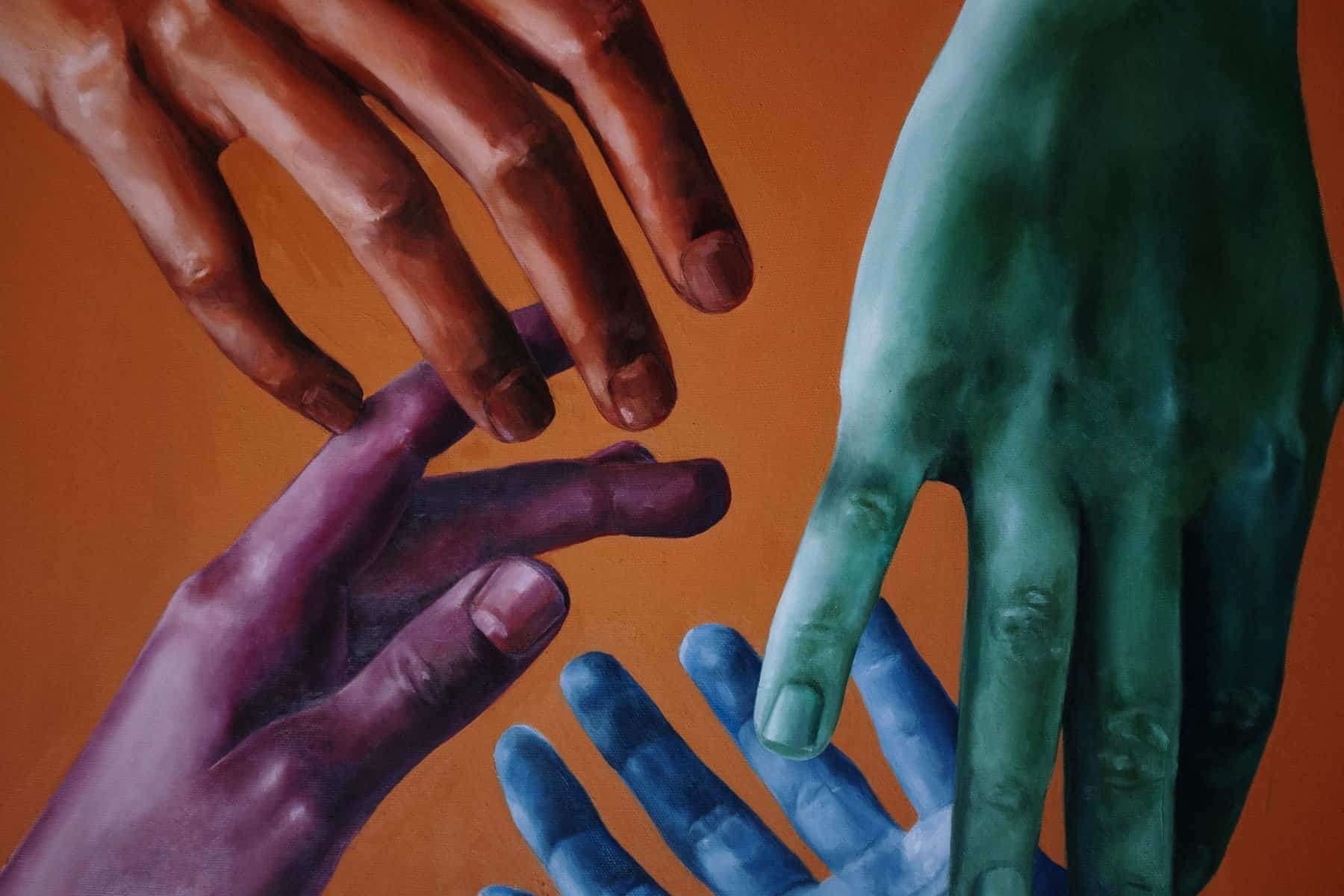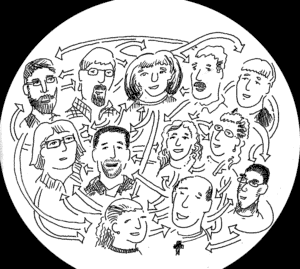(or, Why You Should Apply for the Next Oriented to Love Dialogue)
“Come to me, all you that are weary and are carrying heavy burdens, and I will give you rest. Take my yoke upon you, and learn from me; for I am gentle and humble in heart, and you will find rest for your souls. For my yoke is easy, and my burden is light.” (Matthew 11:28-30, NRSV)

This passage of scripture appeared in my mind as I was packing my bag for a weekend trip last Thursday. The reason was not apparent, and when it began to play on repeat for an hour as I finished my travel preparations I became slightly annoyed. At one point I stopped in frustration to ask God directly, “Why aren’t you letting me put this out of my thoughts today? You know how exhausted I am these days. With work, research, constant doctors appointments, tension at church, and now a weekend out of town, I can’t see myself getting any meaningful rest anytime soon, physically or spiritually.”
Fast forward two days, and I’m standing over my bed at a retreat center near Philadelphia, repacking my bag and wondering how the weekend could have come to a close so quickly. I’m feeling hopeful, grateful, and rested.
Months ago, I applied to participate in an Oriented to Love dialogue. Oriented to Love, sponsored by Christinas for Social Action, is an opportunity for 12 people from vastly different backgrounds to come together for conversation about faith and sexual orientation in Christianity. The goal is to share stories and listen to others’ stories in order to build empathy. This was not a space for theological debate and attempts at changing the opinions of others. I’ll admit that when I first applied, pride was one of my motivators. Because the call for applicants emphasized seeking participants with diverse experiences, I thought, “As one half of a celibate LGBT couple, I can contribute a perspective that probably no other applicant can. I doubt any other celibate couples will be applying.” After having participated in the dialogue, I’m a bit ashamed to own up to that. Every person I met this weekend had something unique to contribute, and I encountered some perspectives that I didn’t even know existed.
Amongst the 12 of us who were chosen for the dialogue, multiple Christian traditions were represented. Our group consisted of Catholic, Orthodox, and Protestant participants who are gay, straight, and questioning. I met parents of gay adult children, people in mixed orientation marriages who are committed to being faithful to their spouses, straight allies, and straight people who might not necessarily identify with the term “ally” but are nonetheless committed to making their churches safe spaces for LGBT members. I met people who use LGBT language and others who describe their journeys using the term “same-sex attraction (SSA).” I also met people who disagree vehemently with each other on gay marriage, same-sex sexual activity, and same-sex relationships. I wasn’t surprised to meet a couple of folks (one more liberal and one more conservative) who admitted to seeing celibate partnership as a bizarre concept. Yet my experience of the dialogue was marked by peace and comfort rather than anxiety over the possibility of being misunderstood, and within less than an hour of being in the same room with the 11 other participants I sensed a natural bond amongst us all.
Because of my hope that after seeing this some of our readers will consider applying for the next dialogue, I’ll try not to give away too many of the details. Mostly, I want to tell you what I learned from the dialogue and what the experience was like for me personally. I came into the weekend anticipating that I would have trouble relating to other dialoguers. This is partly because I have never been evangelical, and thus had no idea what to expect from an event run by an evangelical organization. But during the actual experience, I was amazed not only at the ease of communication but also at the level of mutual respect we participants showed for one another. Some of my best one-on-one conversations were with people whose viewpoints on many theological and moral matters are worlds apart from mine.
The dialogue weekend helped me to do what Lindsey and I often wish that others would do: appreciate people as people rather than seeing them first as symbols of ideologies. As a celibate gay person who has experienced significant pain from being caught in the middle of the culture wars, I found it humbling to share insightful dinner table conversation with people who fit within broader categories that have contributed to my feeling unwelcome in the Church.
It also reminded me that my conclusions are not the only possible conclusions for a rational person to reach. Being in an environment devoid of the “no true Scotsman” fallacy was a precious opportunity. Many of the dialoguers on all sides even expressed frustration at conversations in their own churches that devolve into, “A true Christian could never possibly believe x, y, or z.” Being able to share in that common frustration side by side with people who believe very different things than I do was healing.
Last weekend, I learned that there are many sincere people at various points on the ideological spectrum who want to walk with me and encourage me in my journey toward Christ. There are liberal, conservative, moderate, LGBT, and straight/cisgender people in all Christian traditions who will readily acknowledge all the ways their Christian traditions have failed in ministering to sexual and gender minorities. And even more inspiring: they are committed to changing this and fighting for those whom their churches have marginalized.
I saw evidence of how the affirming vs. non-affirming dichotomy heightens tension and silences Christians who would otherwise be interested in supporting their LGBT bothers and sisters. I had the opportunity to listen as straight Christians holding a traditional sexual ethic listed all the ways they are ready to affirm LGBT people. There was affirmation of the importance of meaningful human relationships, the toxicity of viewing LGBT celibacy as nothing more than “God says no,” and the shameful treatment that straight Christians have doled out to LGBT Christians under the guise of “love.” I wept with my straight, conservative brothers and sisters as they shared their sadness at being depicted as heartless homophobes.
I connected with my own areas of vulnerability, came to see how our struggles connect us as humans, and allowed the other 11 dialoguers to bear my burdens with me. I was surprised at how freely I was able to share my exhaustion, anger, and sorrow from managing chronic health conditions, and also my fear of falling back into addictions as a way of coping with the unmanageableness of it all. I met others in the pain they brought into the weekend too, and now that I’m back home I will continue to remember each of them in my daily prayers. In so many ways, the dialogue has ignited my prayer life.
I felt an inexplicable sense of synergy during the dialogue. Most of the time I’m skeptical of the idea that individuals can make a meaningful difference toward ending a longstanding injustice. One of the thoughts I had upon entering the dialogue room was, “If everyone here is at least moderate enough to be willing to talk with others who are different from them, are we really going to accomplish anything? These people are probably already working toward making their churches safer for LGBT members.” But I was reminded that we all have blind spots, and some of those showed themselves over the weekend. It’s possible to be working toward creating safety and welcome, but to be doing it in ways that one doesn’t even realize are counterproductive and hurtful. We talked about those things, and I experienced some realizations about ways I need to change my behavior toward others. There was a great deal of creativity and challenge in those discussions, and I left with a sense that our little group can and will make a difference as we re-enter the world post-dialogue.
My most significant takeaway from the dialogue was hope that things will not always be so painful because slowly but surely, people are changing. Christians want to be loving, but sometimes we don’t know how to live up to the two great commandments. Sometimes, we hurt people when we honestly don’t intend to do so. We think our words and actions are loving, and often we can’t see how others are receiving our words and actions. Now, more people are beginning to take this seriously and reevaluate their approaches to marginalized members of their faith communities. It’s challenging to wait around for Christians to begin acting like Christians, but God showed me during the dialogue that that statement includes me as well as the most hostile person at my parish.
To my great surprise, I was not yet ready to take a break from dialoguing after returning home. Lindsey and I spent hours that evening debriefing and processing my experience. We asked ourselves some of the same questions I had discussed with the other dialoguers and continue to consider prayerfully how we can use what I learned to strengthen our vocation and the work that we do on a daily basis in blogging. We’ve been thinking about what it actually means for a person to be “oriented to love,” and we pray that God grants us greater insight into this as we move forward in our ministry together.
I would give the Oriented to Love dialogue my highest possible recommendation to anyone interested in issues of Christian faith and sexuality. At the risk of sounding cheesy, I’ll admit that I consider it a singularly life-changing experience. But seriously, you need to apply. If you care about the Church and how her members respond to each other when it comes to tough issues, you will benefit from this dialogue.
Sarah blogs at A Queer Calling, where this was simultaneously posted.


